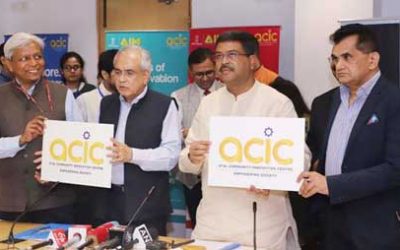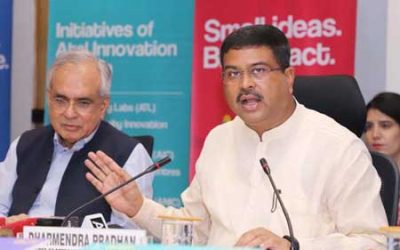
In Focus
Ravindra Kumar
President, IIT Delhi Alumni Association
IIT Delhi can help develop an Indian equivalent of Google or Facebook.
The global pandemic has transformed our way of working and pushed us further towards digital transformation. Digital technologies such as online streaming, collaborative tools, videos, internet of things (IoT), virtual and augmented reality (VR/AR) have made access to health and public utilities easier, even during the pandemic. Despite the unprecedented and challenging times, digital technologies have enabled us to discover new ways to work, collaborate, and innovative.
Changing consumer behavior and the digital ecosystem’s growth has created many opportunities for startups and next-generation entrepreneurs to develop ideas that can help society fight the crisis, create future engagement models, and reinforce productivity.
The alumni of the Indian Institute of Technology (IIT) Delhi, the country’s elite engineering and tech school, are leading the country’s tech-startup space. According to Tracxn, as of October 2020, there were 830 companies, including seven unicorns, founded by the alumni of IIT Delhi. These companies have raised over the USD19.68 billion in funding from 1,050 investors. The likes of Grofers, Flipkart, and Inshorts are some of IIT Delhi alumnus’s well-known products.
One of the biggest challenges that many early-stage tech startups face is the limited mentorship programs, ideas to generate funding, and establishing industry linkage. IIT Delhi has recently taken several new initiatives to create an enriching tech-startup ecosystem in India and guide deep-tech entrepreneurs.
Jatinder Singh of Better World recently interacted with Ravindra Kumar, President of the IIT Delhi Alumni Association (IITDAA), to understand IITD’s role in fostering its entrepreneurial ecosystem. Kumar spoke at length about IIT’s focus on deep technology, digital transformation, new initiatives from the legacy network, and building solutions to address the COVID-19 outbreak.
Excerpts of the interview:
Better World: In the current context of crisis and uncertainty, how do you intend to take advantage of your strong heritage network’s experience and potential to foster entrepreneurship and develop future-proof solutions?
Ravindra Kumar: The alumni of IIT Delhi are well known to play a pivotal role in India’s economic growth by building new startups and creating millions of employment opportunities (direct and indirect) in the country. Fostering entrepreneurship and nurturing tech startups has always been a key priority area for IIT Delhi. Over the last five decades, we’ve been one of the most successful institutes in creating entrepreneurs.
Our mandate is to interact with our students and alumni network every week to discuss the economy’s challenges and how entrepreneurship can help address those issues. We discuss and deliberate on ideas and cutting-edge solutions that can help resolve challenges, let’s say, related to the ongoing COVID-19 situation, in an effective way.
To address the COVID-19 crisis, IITDAA has adopted a renewed vision. We are stepping up our efforts to become a world leader among alumni organizations from universities worldwide.
Amidst the unprecedented COVID-19 scenario, we’ve taken several new initiatives such as building new digital networks for our alumni, introducing a new annual event, mobile app, and virtual connects, among others. These initiatives have been taken to ensure that our students get well connected with our alumni and take inspiration and guidance frequently. We utilize technologies such as artificial intelligence (AI), blockchain, and cloud to get all our students and alumni together and build a global outreach.
Through our AI-based tools, we also try to find out who (former of IIT Delhi) is working where and their key areas of interest and connect all our students through alma connect channels. Various digital forums and learning sessions are regularly organized to keep future leaders (students) informed about industry needs.
Moreover, at IIT Delhi, there is an inbuilt ecosystem of intrapreneurship. From faculty and students to alumni, everyone forms a group of self-motivated and action-oriented people who are always ready to help each other. They share a very symbiotic relationship. It’s a culture that has taken a lot of time and effort, and collaboration to build. Nothing happens overnight.
Today, IIT Delhi is home to more than 50% of Indian origin Unicorn companies. That shows how strong our fundamentals are. Going ahead, a massive opportunity exists in the space of deep-technology and digital transformation. Our faculty and students regularly exchange their observations and potential ideas with industry thought leaders and alumni network. A lot is work in progress!
You will find it interesting to know that even our faculty is now actively involved in developing startups. Until last year, most faculty members focused on mentoring students. However, that will change because they will be working on building their companies. This year, we’ve launched Faculty Innovation and Research Driven Entrepreneurship (FIRE) for our faculty members. Through this initiative, faculty will receive the necessary infrastructure, paid leave, and financial support to develop innovative solutions for societal challenges. The shortlisted ideas will be given a grant worth Rs 50 lakh. We are optimistic that such steps will further spread the learning culture to students of all departments.
Better World: That’s remarkable to observe. Are you also opening doors for aspiring entrepreneurs with perhaps no IIT background but revolutionary ideas?
Ravindra Kumar: Indeed, yes. Our endeavors are not just fixed or confined to IITians. After all, we are all indebted to this country, and we understand that there is a massive repository of exceptionally talented people out there in the market. We recognize that everyone can’t study or go to a premier engineering institute despite great talents.
We have undertaken several initiatives to enhance our engagement with the startup ecosystem and provide new entrepreneurs with rapid access to our workspaces, cloud platforms, faculty, and alumni.
We offer space, funding, and mentoring opportunities for entrepreneurs, students, and faculty from different universities and countries. Our effort is to become a global startup destination and enable a path for a wave of entrepreneurship.
Ravindra Kumar
President, IIT Delhi Alumni Association
A technocrat, Ravindra Kumar is now an entrepreneur with over three decades of industrial experience. Currently, as President of IIT Delhi Alumni Association, he is spearheading various alumni initiatives and strengthening the startup ecosystem at the country’s premier institute.
Ravindra is an eloquent speaker and is regularly invited to various seminars and events covering TPS, legal metrology, law and technology, and alumni issues.
Ravindra has previously worked with Bharat Heavy Electricals Limited (BHEL) and the Central Board of Indirect Taxes and Customs (CBIC), Department of Income, Ministry of Finance, Government of India. He also runs Global Tax Guru, a customs and GST tax advisory firm; and Global Supply Chain Guru, an export and import logistics company.
Expertise
- Indirect tax consultant: Customs, service tax, excise, goods, and service tax (GST)
- Global supply chain & logistics
- E-customs
- CAD as a teaching tool for engineering students, CAD as a language, and design skills through case studies.
Education
- Bachelor’s in Law (LLB), CCS University, Meerut, 2015
- Executive MBA (Logistics and Supply Chain Management), Loyola Institute of Business Administration, Chennai, 2007
- B.Tech, Civil Engineering, IIT Delhi, 1987
Besides the incubation facilities in Delhi, our extended campuses in Haryana (Sonepat and Jajhar) are also aligned with our mission to nurture startups and create new entrepreneurial opportunities.
Better World: You also mentioned technology innovations to manage the COVID-19 crisis. Please share a few of the latest ground-breaking solutions launched with the internal support of IIT Delhi.
Ravindra Kumar: To contain the spread of the pandemic, E-TEX and Clensta, two startups incubated at IIT Delhi, have recently unveiled anti-viral t-shirts and COVID-19 protective lotions at affordable prices. The products have been supported by IIT Delhi’s Chemistry and Textiles department. Antiviral t-shirts and creams reduce the rate of contamination and transmission by destroying micro-organisms upon contact. The cellulosic fiber-based t-shirt’s antimicrobial property is so robust that it remains effective up to 30 washes. These are breakthrough advancements and first of their kind. IIT Delhi had earlier also facilitated these startups to develop N95 masks at a price of less than a dollar.
IIT Delhi teachers also bought the products during their launch, and they even gave the kits to their loved ones. So, we intend to promote new-age startups and try to support them with their business models as well. This is entirely consistent with the Indian government’s effort for Atmanirbhar Bharat.
Better World: While India has produced many startups recently, its startup ecosystem still hasn’t offered anything to take on a Google or a Facebook? Should we expect IIT Delhi to play the role of captaining such a fight?
Ravindra Kumar: Well (laughs), that’s an interesting question. The country’s startup ecosystem is undoubtedly growing, and at IIT Delhi, we act as enablers. Our Chairman has issued a mandate that we should develop an ecosystem for entrepreneurship, especially to develop internet startups like Google, where entry barriers are challenging. (See: Paytm Mini App Store: A threat to Google’s dominance?)
Having a breakthrough product like Google from India is possible shortly, and at IIT Delhi, we are geared up to facilitate the necessary support and mentorship. However, we must understand that a great deal of research and development is needed to achieve that.
Better World: Do you face any challenges in supporting young ideas or expanding the IIT Delhi’s entrepreneurial culture?
Ravindra Kumar: Ideas are the bread and butter of entrepreneurs. Like I said, whatever are the challenges at IIT Delhi, we find a way out through idea generation. That’s how our DNA was formed. Our students and teachers will never complain about the challenges in India. They are always supportive and hope to be the agents of change. Whether they stay in India or overseas, you won’t find them using Indian systems as an excuse. India is home to untapped talent. In addition to their areas of study, students also learn to be humble at IITD. They learn to stay calm, and once you get there, you stop criticizing the system. One sees what the system has contributed and we all feel very grateful to this country.
Although we are a developing country, this country has provided one of the world’s best educational platforms. If you look at value for money, it’s one of the lowest globally, with world-class education. On behalf of IIT Delhi, I firmly believe that this is our duty and that we must all give back to our society in the best possible way.
















0 Comments